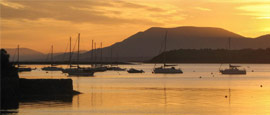Travel to Cork
Flying to Cork
Airlines offering flights to Cork from the UK include Aer Lingus and Ryanair. There are no direct flights from the USA, but plenty of connections through mainland Europe. Flight prices remain pretty consistent year-round, but try to book in advance during busy periods and holidays such as Christmas.
From London - 1 hour 25 minutes; New York - 10 hours (including stopover); Los Angeles - 13 hours 15 minutes (including stopover); Toronto - 9 hours 35 minutes (including stopover); Sydney - 28 hours (including stopover).
Website:www.corkairport.com
Location:
Cork Airport is located 8km (5 miles) to the south of central Cork.
Money:
The bureau de change (open 0500-2200 daily) are located on the lower level, next to the WHSmith bookshop. There is an ATM located next to the ICE Currency Exchange on the ground floor.
Luggage:
For items lost or found at Cork Airport, call the lost property office (tel: +353 21 431 3131 then press 4). Items left at the lost property office will be kept for 90 days after which it will be disposed of. Lost items can be reported missing at www.corkairport.com. Valid ID is required when collecting lost property. A €5 handling fee is payable for each lost item that is returned to its owner.
Travel by road
The roads in Ireland have greatly improved in recent years, especially the motorways. Twisting country lanes can still be hazardous and slow moving thanks to farm traffic and animals on the road.
Traffic drives on the left in Ireland and signposts are usually bilingual. On motorways a speed limit of 120kph (74mph) applies, while on national roads and dual carriageways, the speed limit is 100kpm (62mph), dropping to 50kph (31mph) in towns and cities.
Those driving must be at least 17 years old and hold a valid national driving licence. A Green Card and Motor Insurance certificate are recommended too, but drivers do not need an International Driving Permit.
A country identification sticker is compulsory, as are seat belts. The Automobile Association of Ireland (tel: +353 1 617 9104; www.theaa.ie) provides information on reciprocal agreements with other motoring associations.
AA Ireland (+353 1 617 9560).
The main routes into Cork are the M8, which works its way southwest from the M7 out of Dublin, and the N20, which runs into the city from Limerick’s M20. Killarney is connected to Cork via the N22, while the Wild Atlantic Way is the scenic option from Kerry to Cork, affording great views of the Atlantic Ocean.
From Dublin - 2 hour 45 minutes; Galway - 2 hours 40 minutes; Limerick - 1 hour 30 minutes; Waterford - 1 hour 50 minutes; Cóbh - 30 minutes; Belfast - 4 hours 15 minutes.
The main coach operator to and from Cork is Bus Éireann (tel: +353 21 450 8188; www.buseireann.ie), which operates out of the bus station at Parnell Place. It runs frequent, direct coach services between most of the major towns and cities in the Republic of Ireland, including Dublin, Galway, Limerick, Sligo and Waterford. Routes to Belfast require a change at Dublin Airport.
Travel by rail
Train services to Cork are regular and reliable.
Kent Station (tel: +353 21 450 6766), Cork's main railway station at Lower Glanmire Road, is 10 minutes from the city centre. The station has free Wi-Fi.
Irish Rail (Iarnród Éireann) (tel: 1850 366 222, in Ireland only or +353 1 836 6222; www.irishrail.ie) is the main rail operator in Ireland. From Cork, it runs services to most of the country, including Kerry, Limerick, Waterford and Wexford as well as direct intercity rail services to Heuston Station in Dublin and commuter services to the town of Cóbh by Cork harbour.
From Dublin - 2 hour 30 minutes; Galway - 4 hours 30 minutes (including change); Limerick - 1 hour 30 minutes (including change); Waterford - 3 hours (including change); Cóbh - 25 minutes.
The easiest way to get to the city centre is by taxi and there is a taxi rank just outside Kent Station. Alternatively, buses 226 and 226A, operated by Bus Éireann, take around 10 minutes from the station to the city.
Travel over water
The main port at Cork is the Ringaskiddy ferryport, 22km (13.5 miles) southeast of the city.
There is also a dedicated cruise berth in Cóbh, 23km (14 miles) southeast of the city.
Brittany Ferries (tel: +353 21 427 7801; www.brittanyferries.ie) operates an overnight ferry once a week (April to October) each way between the ferryport at Cork (Ringaskiddy) and the port of Roscoff in Brittany, France. Ferries from Cork to Roscoff depart on Saturdays, while return sailings from Roscoff to Cork run on Fridays. The average crossing time is 14 hours.
The best way to get to Cork city centre from Ringaskiddy is via the bus service, which meets arriving ships. If travelling by car, take the N28 road towards Cork. The journey should take approximately 30 to 40 minutes.
Trains run every half an hour from Cóbh to Kent Station in Cork, taking just under 25 minutes. If travelling by car, take the R624 north and join the N25 westbound, which takes you straight to the city in around half an hour.
Do you have any Feedback about this page?
© 2026 Columbus Travel Media Ltd. All rights reserved. No part of this site may be reproduced without our written permission, click here for information on Columbus Content Solutions.








 You know where
You know where